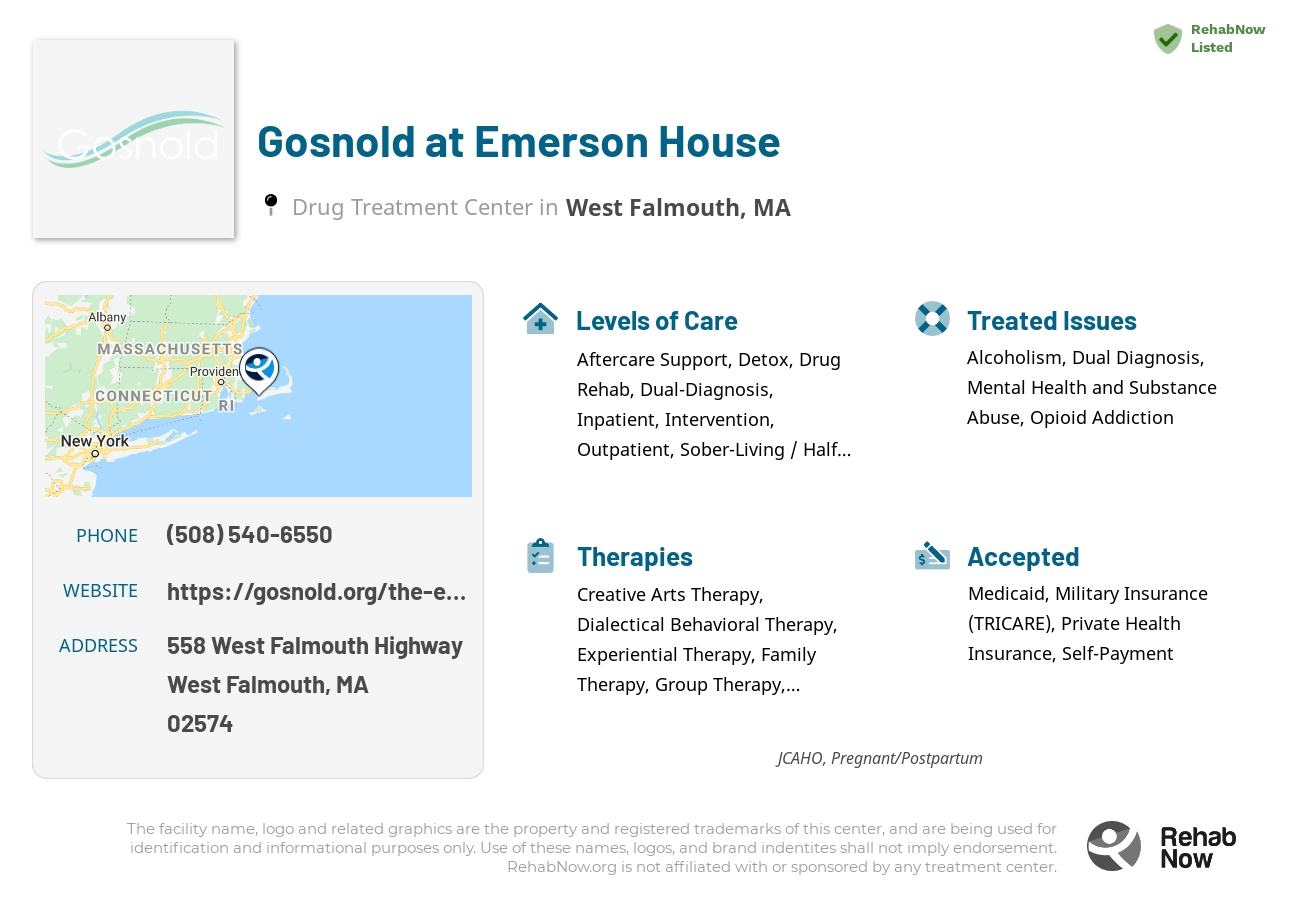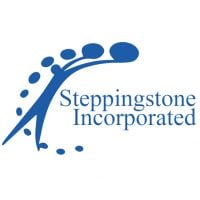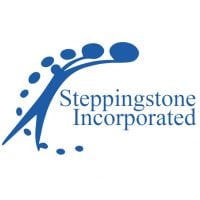Gosnold at Emerson House
Drug Rehab Center in West Falmouth, Massachusetts
Gosnold at Emerson House is a Joint Commission on Accreditation of Healthcare Organizations (JCAHO)-accredited health center offering comprehensive addiction treatment services, including aftercare support, residential programs and insurance acceptance.
About This Massachusetts Facility
Gosnold - Emerson House is an Addiction Treatment Facility located in Falmouth, Massachusetts. Established in 1972, this facility specializes in treating individuals suffering from alcoholism, opioid addiction, dual diagnosis, drug addiction, substance abuse, and mental health disorders. Gosnold - Emerson House offers a comprehensive range of services, including aftercare support, detoxification, drug rehabilitation, dual-diagnosis treatment, inpatient care, interventions, outpatient programs, sober-living / half-way houses, residential programs, and partial-hospitalization. Accredited by JCAHO, NAATP, and SAMHSA, this facility is dedicated to providing high-quality addiction treatment and support to individuals in need.
Gosnold - Emerson House in Falmouth, Massachusetts, is affiliated with Gosnold, a well-established organization committed to helping individuals overcome addiction and substance abuse. This facility offers a diverse array of services to address the specific needs of their patients. They provide aftercare support to ensure a smooth transition into recovery and to prevent relapse. Detoxification services are available to individuals in need of a medically supervised process to safely withdraw from drugs or alcohol. For those seeking intensive treatment, Gosnold - Emerson House offers inpatient and residential programs. They also provide outpatient programs for individuals who do not require 24/7 care but still require support in their recovery journey. Finally, partial-hospitalization programs are available to individuals who need structured treatment during the day but prefer to return home at night. Overall, Gosnold - Emerson House offers a comprehensive range of services to support individuals struggling with addiction and substance abuse.
Genders
Ages
Modality
Additional
Accreditations
SAMHSA
NAATP

JCAHO
Conditions and Issues Treated
Substance abuse is defined by the continued use of drugs or alcohol despite negative consequences, such as legal or work problems. It can be treated using a variety of services, including therapy and medication.
Substance abuse treatment is beneficial for:
- People who have been using drugs or alcohol for a long time.
- People who have been using drugs or alcohol to cope with stress, anxiety, or depression.
- People who have a mental health disorder in conjunction with substance abuse.
- People who continue to use drugs or alcohol despite the harmful effects they cause on their own life and the lives of others.
- People who have had multiple failed attempts at recovery without medical assistance.
If you believe that addiction treatment is right for you or a loved one, you can contact your primary care physician, or search for addiction treatment centers in your area. Treatment is beneficial to people who are motivated towards recovery, and who understand the benefits of professional care.
Opioid addiction is the result of repeated use, or abuse, of opioid drugs. It is recommended for people who are dependent on opioids, or who have a high risk for dangerous health concerns, to seek professional treatment. Treatment plans usually include behavioral therapy and medication-assisted treatment.
Opioid drugs include: fentanyl, heroin, methadone, oxycodone, and oxymorphone.
Opioid addiction treatment is beneficial for:
- People who have a history of severe withdrawal.
- People with a high risk for dangerous health concerns.
- People having difficulty overcoming opioid addiction on their own.
There are different kinds of Dual Diagnosis:. A person who simultaneously experiences both a mental illness and an addiction disorder. Or, a person who experiences one or more coexisting (simultaneous) mental health conditions in addition to a primary substance use disorder.
The treatment requires a multi-disciplinary approach, it’s crucial for individuals to partner up with a healthcare provider who understands all the recovery components.
Levels of Care Offered at Gosnold at Emerson House
This center offers a variety of custom treatment tailored to individual recovery. Currently available are Aftercare Support, Detox, Drug Rehab, Dual-Diagnosis, Inpatient, Intervention, Outpatient, Partial-Hospitalization, Residential, Sober-Living / Half-Way, with additional therapies available as listed below.
Detox is the stage of recovery where the drugs or alcohol are entirely removed from your body. There are two different ways to detox, with medications and without. For many drugs and alcohol, the acute phase of detox can be completed in a number of days.
Inpatient treatment is the most intensive level of care, and it’s necessary for those who aren’t able to control their addiction. These patients also must be drug-free before attending inpatient programs .
During inpatient treatment, addicts live at an inpatient facility 24 hours a day while receiving help. This type of program is generally recommended for those who need to go through detoxification or who are struggling with serious addiction-related issues.
The outpatient programs in West Falmouth, MA are for those addicted drugs or alcohol. The goal of the outpatient rehabilitation program is to make them stop abusing drugs or alcohol, reduce drug use or addictive behaviors, and become entirely sober. It is generally required to attend the outpatient program for 10-12 hours every week.
Patients can be administered on-the-spot medication to ease withdrawal symptoms such as anxiety, increased heart rate, and even depression. Groups such as Alcoholics Anonymous (AA) and Narcotics Anonymous (NA) can be used as a part of outpatient treatment to help maintain sobriety.
A Partial Hospitalization Program (PHP), also known as an Aftercare Program, is a short-term intensive treatment program usually consisting of five (5) days a week. A PHP can be an effective alternative for those who cannot commit to living in a rehab facility 24/7 but require daily medical supervision. A PHP provides comprehensive addiction services seven (7) days a week and is usually attended by the addict every day.
This allows addicts to continue working, stay close to their family and friends, and minimize disruptions to their daily routines. Upon entering a PHP, patients are assessed by Addiction Psychiatrists, Medical Doctors (MD), Nurses, Psychologists, and Therapists. This assessment will determine the appropriate level of care.
Although PHP’s are similar to residential programs, they lack 24-hour supervision. This is because aftercare patients are still expected to follow the rules of their recovery and meet specific goals. This will allow them to assimilate back into society without relapse.
A Sober Living Home (SLH) is a term used to describe houses where people recovering from addiction can stay. The goal of these places is to provide immediate support and protection that the addict needs and force them to live a life free from substance abuse. SLH’s typically allow the addict to live there for 30, 60, or 90 days.
Residential treatment programs are those that offer housing and meals in addition to substance abuse treatment. Rehab facilities that offer residential treatment allow patients to focus solely on recovery, in an environment totally separate from their lives. Some rehab centers specialize in short-term residential treatment (a few days to a week or two), while others solely provide treatment on a long-term basis (several weeks to months). Some offer both, and tailor treatment to the patient’s individual requirements.
The main goal of an intervention is for the addict to go to rehabilitation and address their addiction.
Interventions are meetings organized by friends and family of an individual with addiction. A specialist is present to lead the discussion and motivate the addict to seek external support. Intervention services help family members to open up about their feelings and concern for the addict. This expressiveness usually results in the addict seeking treatment at a rehabilitation facility.
Aftercare support is a service many addicts need to ensure their success at recovery. This service usually includes one-on-one or group therapies, assistance from a sponsor and other types of help designed to make sure the patient continues living a life free from drugs.
Patients also may require medication to help them battle addiction. Some people have been able to successfully recover without additional medications, but others have found that they need help during their transition. Long-term, the patient must take the initiative to attend meetings and receive help from other addicts in recovery.
Therapies & Programs
People in addiction recovery can benefit from individual therapy. This type of therapy involves meeting with a therapist one-on-one. This allows for a personal and trusting relationship to be built so that the patient can be truly themselves and express any emotions they feel. Individual therapy leads to greater understanding and peace about your triggers for addiction and coping strategies to prevent relapse.
Couples therapy for drug addiction is based on the belief that addiction is a family disease. Everyone involved with an addict, not just the addict themselves, is affected by their behavior and the changes the addict goes through. The relationship also changes the addict’s significant other and has likely picked up some codependent behaviors. Codependency is a term used to describe a person obsessed with another person and their needs and feelings while neglecting their own. Addicts are usually people-pleasers, so it is understandable how one can become codependent in relationships with addicts.
Family therapy is a type of group problem-solving that aims to improve communication and relationships between the patient, their family, and sometimes friends. The main goal of family therapy for drug addiction is to create an environment where communication can occur without judgment, hostility, or blame. The therapist is with the family as they learn to communicate with each other differently, especially with the addict when s/he is using.
Group therapy sessions are held in rehab facilities, clinics, churches or community centers that offer drug addiction treatment. People who attend these groups are encouraged to voice their feelings and support other addicts in recovery. This helps group members strengthen their own recovery program while cheering on others who are struggling with sobriety.
Group therapy sessions provide recovering addicts with a chance to cope with everyday situations that many face. Group therapy sessions are held in rehab facilities, clinics, churches or community centers that offer drug addiction treatment.
People who attend these groups are encouraged to voice their feelings and support other addicts in recovery. This helps group members strengthen their own recovery program while cheering on others who are struggling with sobriety.
If you’re looking for addiction treatment, it’s important to find a facility that offers trauma therapy. This type of therapy helps people process and understand the past traumas that have led to their addiction. Trauma therapists will work with clients to help them understand their past and present relationships and show them that they are worthy of love. This therapy is typically done using visualization, discussion, and writing down thoughts and feelings.
Trauma Therapy is a form of therapy that involves working with a patient to help them process and understand the past trauma(s) in their life. This therapy is typically done using techniques such as visualization, discussion, and writing down thoughts and feelings. The main goals of trauma therapy is to help clients express their emotions and talk about what they are feeling.
Dialectical Behavior Therapy (DBT) is a form of cognitive-behavioral therapy that helps people understand how they connect their thoughts, behaviors, and feelings. It can give them more control over their actions, effectively stopping self-harm ideations and attempts in some patients. It also helps put those with borderline personality disorder into control for managing mental struggles.
A new study has shown that DBT works for those with self-harm behaviors and addictions by giving them therapy they can relate to and understand.
Cognitive Behavioral Therapy (CBT) helps addicts identify faulty, negative thinking so that they can work together with the therapist to find healthier ways of thinking. CBT focuses on specific aspects of each person’s thinking, feeling, physiology, and behavior. It aims to identify specific problems in these areas, and create a personalized treatment strategy.
12-Step Program is used by drug treatment centers to get addicts sober. The treatment is outlined by Alcoholics Anonymous and Narcotics Anonymous books which detail the steps drug users need to take in order to get sober. The program is often used as a part of an inpatient or outpatient treatment program and is frequently recommended by doctors.
The 12 steps typically begin with addicts admitting they need help. They are then guided through the steps by a sponsor, someone who has already struggled to get sober themselves. They will work through physical withdrawal symptoms, identify the problems that led to their addiction and learn how to resist cravings.
Addicts often experience intense cravings for sugary foods during recovery. By teaching addicts how to eat well and stay healthy, therapists can help them manage their cravings over the course of treatment.
During these sessions, West Falmouth, Massachusetts dietitians and therapists will offer advice about healthy eating options and teach addicts how to make specific changes in their diet that can help reduce the effects of cravings during recovery.This type of therapy is often used in conjunction with other types of addiction treatment services. By identifying specific triggers and developing strategies to help addicts avoid relapse, most individuals can overcome their cravings and stay sober for good after they finish rehab.
The first step to becoming a non-smoker is the choice to quit smoking. Nicotine replacement therapies are effective because they provide you with the nicotine you are addicted to without inhaling carcinogens from cigarettes.
There are several types of NRT. These include:
- Nicotine gum
- Nicotine patches (transdermal systems)
- Nasal spray
- Lozenges
The benefits to using NRT can include:
- Reduce the risk of heart disease and cancer
- Reduce the anxiety and irritability associated with quitting smoking
- Reduce the risk of type II diabetes.
- Improved fertility in women
Patient Experience
Creative Arts
Creative Arts Therapy is a treatment method for patients of Gosnold at Emerson House in West Falmouth, Massachusetts who are victims of addiction to drugs, alcohol, or other substances. Group Creative Arts Therapy sessions help addicts get sober by allowing them to meet and talk with peers who are going through the same problems. This builds trust and helps addicts understand that they are not alone. Depending on the severity of the patient’s drug or alcohol problem, they may attend group creative art therapy sessions or individual sessions.Experiential Therapy at Gosnold at Emerson House
Experiential Therapy allows addicts to release emotions in a safe environment. The process involves addicts painting their feelings and releasing them on a canvas. LPE – Love, Peace, and Equilibrium is one of the most popular forms of experiential therapy.
Payment Options Accepted
For specific insurance or payment methods please contact us.
Is your insurance accepted?
Ask an expert, call (888) 674-0062
Gosnold Associated Centers
Discover treatment facilities under the same provider.
- Gosnold Treatment Center - Falmouth in Falmouth, MA
- Gosnold - Centerville in Centerville, MA
- Gosnold - Miller House in Falmouth, MA
- Gosnold - Thorne Counseling Center in Brockton, MA
- Gosnold Thorne Counseling Center - Mashpee in Mashpee, MA
Learn More About Gosnold Centers
Additional Details
Specifics, location, and helpful extra information.
West Falmouth, Massachusetts 2574 Phone Number(508) 540-6550 Meta DetailsUpdated November 25, 2023
Staff Verified
Patient Reviews
There are no reviews yet. Be the first one to write one.
West Falmouth, Massachusetts Addiction Information
Massachusetts has one of the highest rates of drug abuse in the country. More than half a million Massachusetts residents abuse alcohol while more than 1.5 million use illegal drugs each year. This drug and alcohol usage is the cause of over 8% of all deaths in the state. In 2017, Massachusetts ranked in the top 10 of the states with the highest opioid overdose rates.
Treatment in Nearby Cities
- Provincetown, MA (39.5 mi.)
- Bedford, MA (69.8 mi.)
- Franklin, MA (51.5 mi.)
- Randolph, MA (44.1 mi.)
- Quincy, MA (48.9 mi.)
Centers near Gosnold at Emerson House
The facility name, logo and brand are the property and registered trademarks of Gosnold at Emerson House, and are being used for identification and informational purposes only. Use of these names, logos and brands shall not imply endorsement. RehabNow.org is not affiliated with or sponsored by Gosnold at Emerson House.










